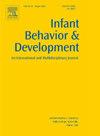在基于实验室的自由游戏任务中,角色区分的双手操作。
IF 1.9
3区 心理学
Q3 PSYCHOLOGY, DEVELOPMENTAL
引用次数: 0
摘要
婴儿一天中的大部分时间都花在玩耍上,并积累了大量的物体互动。随着婴儿的发育,他们会进行越来越复杂的双手动作,比如角色差异化的双手操作(RDBM),其中每只手都扮演着不同的角色。RDBM在结构化的实验室环境中有很好的记录,但这些研究限制了婴儿可以参与的玩具类型和姿势。因此,以前的研究是有限的,因为他们没有模拟日常婴儿物体的相互作用。39名13个月和39名24个月大的婴儿参与了一项20分钟的实验室自由游戏任务,该任务旨在模拟日常物体的相互作用,以评估RDBM的患病率,并了解姿势、玩具大小和玩具重量对RDBM的影响。尽管这两个年龄组都经常参与物体互动,但RDBM在实验室自由游戏任务中并不像之前在结构化环境中那样经常发生。而婴儿在进行RDBM时,会选择不同大小和重量的玩具,他们更喜欢轻的玩具,并且在进行RDBM时更喜欢坐着。13个月大的婴儿更喜欢小玩具,而24个月大的婴儿在互动中更多地使用中型和大型玩具。使用基于实验室的自由游戏任务来检查RDBM,进一步加深了我们对复杂的双手行为是如何在自然环境中出现的理解,在自然环境中,婴儿可以采取各种各样的姿势并与各种玩具互动。本文章由计算机程序翻译,如有差异,请以英文原文为准。
Role differentiated bimanual manipulation during a lab-based free play task
Infants spend a significant portion of their day engaging in play and accumulate immense amounts of object interactions. As infants develop, they perform increasingly complex bimanual actions, such as role differentiated bimanual manipulation (RDBM), where each hand serves a distinct role. RDBM has been well documented in structured lab settings, but these studies restrict the types of toys and postures in which infants can engage. Therefore, previous studies are limited in that they do not simulate everyday infant object interactions. Infants (39 13- and 39 24-month-olds) engaged in a 20-minute lab-based free play task designed to mimic everyday object interactions in order to assess the prevalence of RDBM and to understand the influence of posture, toy size, and toy weight on RDBM. Although both age groups frequently engaged in object interaction, RDBM did not occur as often in the lab-based free play task as found previously in structured settings. Whereas infants engaged in RDBM with toys of various sizes and weights, they favored lightweight toys and preferred to sit while engaging in RDBM. The 13-month-old infants preferred small toys while the 24-month-olds more often incorporated medium and large toys in their interactions. Examining RDBM using a lab-based free play task furthers our understanding of how complex bimanual behaviors emerge in a naturalistic setting where infants can adopt a wide range of postures and interact with a variety of toys.
求助全文
通过发布文献求助,成功后即可免费获取论文全文。
去求助
来源期刊

Infant Behavior & Development
PSYCHOLOGY, DEVELOPMENTAL-
CiteScore
4.10
自引率
4.80%
发文量
94
期刊介绍:
Infant Behavior & Development publishes empirical (fundamental and clinical), theoretical, methodological and review papers. Brief reports dealing with behavioral development during infancy (up to 3 years) will also be considered. Papers of an inter- and multidisciplinary nature, for example neuroscience, non-linear dynamics and modelling approaches, are particularly encouraged. Areas covered by the journal include cognitive development, emotional development, perception, perception-action coupling, motor development and socialisation.
 求助内容:
求助内容: 应助结果提醒方式:
应助结果提醒方式:


